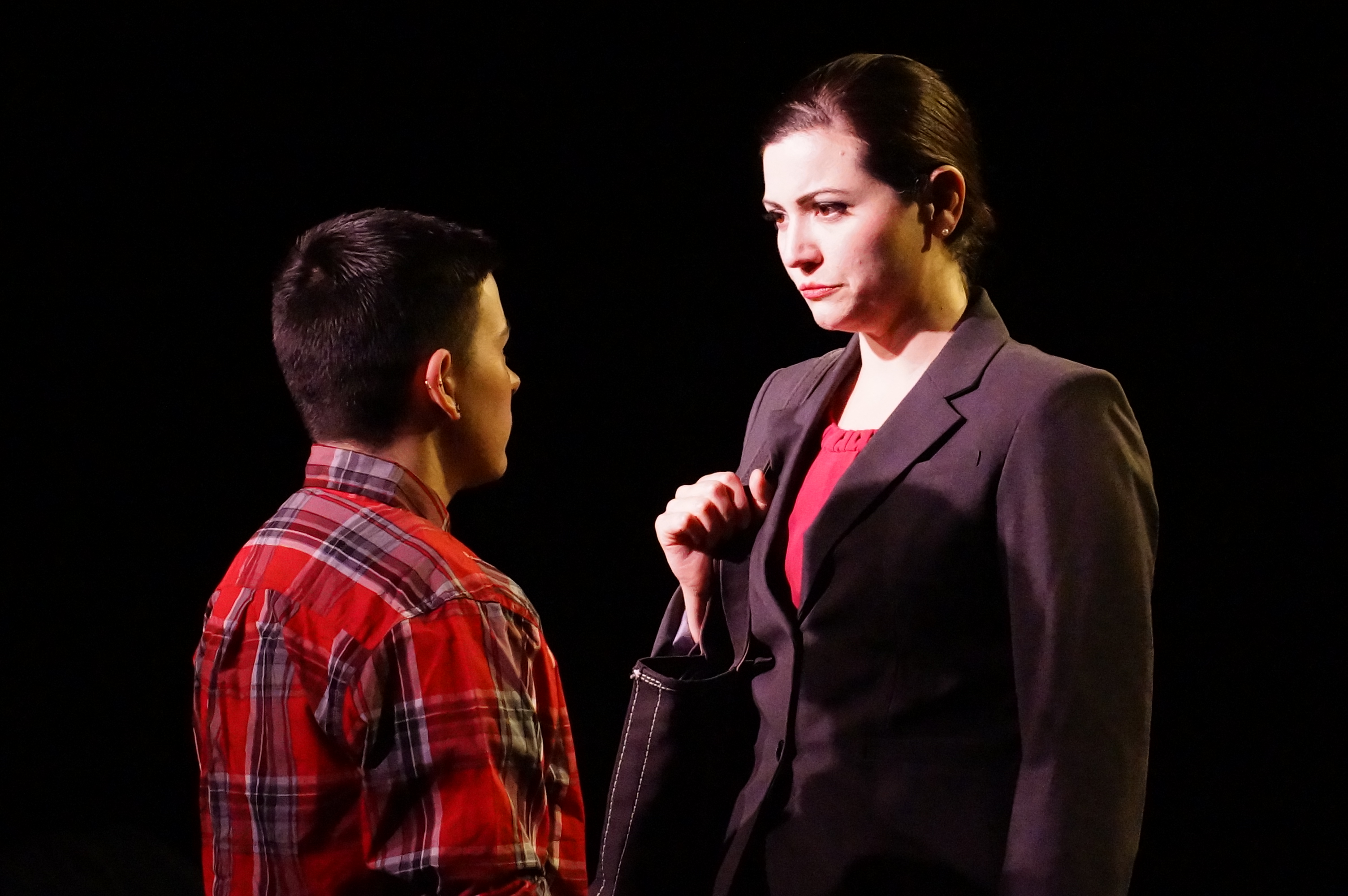‘The Censor’ Demands to Be Seen

When the censor Charlotte (Maura Underwood, R) meets the subversive transgender artist Nellis (Liam Ezra Dickinson), their battle of wits is a battle to behold.
Every year, in cities and towns around the world, vast numbers of new plays are given “world premieres” by small theater companies. You never know what you’ll get with these plays, but a lot of them are pretty good. Sometimes you even hit the jackpot.
A friend and I attended the opening night of David L. Williams’ The Censor at Throughline Theatre. When the lights went up for intermission, my friend turned to me with a grin and said, “We’re going to be able to say we saw it first.”
Yes, The Censor is that good. Theater fans who are quick deciders will be the lucky ones, because the run is short (finishing this Thursday through Saturday, Sept. 22-24). And though the world-premiere version of the script has some flaws, they are outweighed by virtues that make the play an entertaining and thought-provoking gripper. Not to mention a play with so many memorable one-liners that you might suspect the playwright is channeling Oscar Wilde.
Games of Hide and Sneak
The Censor is set in an imaginary country where works of art deemed politically or morally offensive will not fly. Some of the best lines fly between Charlotte, the government censor of the title (played imperiously by Maura Underwood), and Nellis (Liam Ezra Dickinson), a transgender artist under scrutiny for subversion. Born a girl, Nellis now identifies as a man, has received medical treatments to become one, and puts transgender themes in his paintings—all of which are prohibited.
So here’s an early scene with Charlotte grilling Nellis in his studio. Charlotte kicks off the session with a stern bit of artistic advice: “You have to get better at hiding your ideas.”
That’s a bald hint that the censor might actually be sympathetic, which turns out to be the case. Meanwhile, the interview, like many parts of the play, veers into a tantalizing dance between gravity and absurdity. Charlotte mentions another artist she’s had to censor—“the one who writes ‘Anarchy’ on canvases with his own feces”— then fires sharply at Nellis: “Do you know him?”
Nellis (evasively): “Uh, vaguely. In passing.”
Charlotte (reflectively): “I always assumed they were his own feces. I never thought to ask…”
Then later, Nellis comes back to Charlotte with plans for a painting that he’s sure will pass official muster. “It’s a portrait of a man merged with a woman,” the painter says, “and I want to see how many features of the woman I can incorporate into the man. Which sounds problematic, I know. But I’m calling it ‘Marriage.’”
And so the play goes, much of the time. The larger context of the story is that Charlotte, an aggressively ambitious and deeply conflicted woman, had been angling to be promoted to Minister of Culture. Instead, the government dispatched her to an island that’s a backwater outpost of the regime, where—smoldering over the snub—she guardedly but unmistakably begins trying to make friends within the very circle of suspect artists she’s been sent to watch.
Will Charlotte throw off her chains and join the good guys? Or is she out to entrap the locals, hoping to score points back in the capital if she can lure them into doing something truly rebellious, then catch ‘em red-handed?

Lauren (Jessie Wray Goodman) is in hiding, and Daniel (Christopher Collier) is in the art-gallery business. And they’re in love.
There you have the makings of an artsy political thriller. And what I really, really like about The Censor is that it does not settle for being merely that. Nor is it a heavy-handed, didactic play that drills home the message “art good, repression bad” until your teeth hurt.
This play is subtle even when it shouts, twisting back and forth on multiple levels. The cat-and-mouse intrigue is interwoven with some serious (and seriously funny) exploration of the worlds of art and bureaucracy.
Better yet, amid the clashing of issues, personal stories emerge—to the point that the play also becomes a character study, with characters who aren’t simple.
There are two others in addition to Charlotte and Nellis in The Censor, the painter’s friend Daniel, an art-gallery owner (Christopher Collier) and his girlfriend Lauren, a writer (Jessie Wray Goodman). They figure prominently in the action and have their dramatic-laced-with-silly moments at center stage, as when she tries to convince Daniel that she could be in mortal danger from the censor.
Lauren: “I wrote an incendiary book about the king!”
Daniel: “You wrote a kids’ book. About a princess who always has to get her way.”
Lauren: “It was a thinly veiled allegory!”
Eventually, of course, the action turns quite serious. And the final twist in The Censor is a surprise ending that unfolds gradually.
Don’t Let It Burn Away
Complaints? I had a few, but only one that’s worth a mention. Whereas my friend found The Censor sharp and engaging through every minute, I felt the second act could have been tightened. Yet even that act passed the snooze test. I never came close to drifting into semi-dreamland, where some plays have sent me. In The Censor I was impatient to see what happened next.
One of the play’s striking lines is a quotation from the German poet and satirist Heinrich Heine: “Where they burn books, they will also burn people.” Heine earned the distinction of having his books banned in his homeland in two different eras—during his lifetime, in the early 1800s, and a century later by the Nazis.
We don’t know if our country will ever be the kind that bans such plays as The Censor. It seems unlikely. But very good plays can vanish from the scene just through the fickleness of fate, and neither do we know if The Censor will catch on to the extent where it is still being performed a century, or ten years, from today. I recommend seeing it now.
Closing Credits and Ticket Info
Williams’ The Censor is directed for Throughline Theatre by Sarah McPartland. The play closes its run Sept. 22-24 in the Grey Box Theatre, 3595 Butler St., Lawrenceville. For show times and tickets, visit Throughline’s website or call 1-888-71-TICKETS.
Photos are courtesy of Rick Moore.
Mike Vargo, a Pittsburgh-based freelance writer and editor, covers theater for Entertainment Central.
Share on Social Media
Follow Entertainment Central
Latest Stories
Sign up for the EC Newsletter







